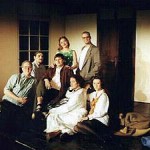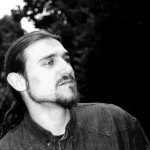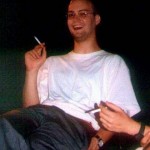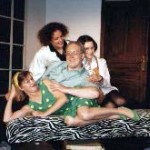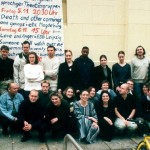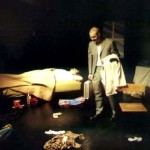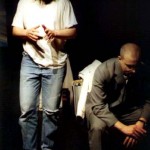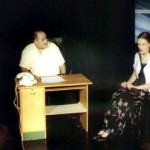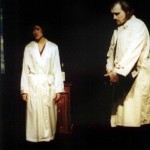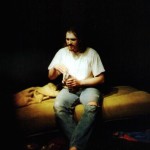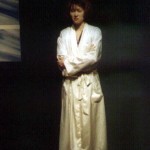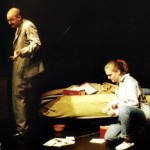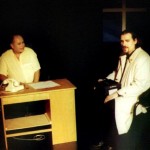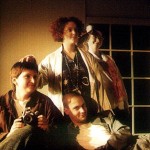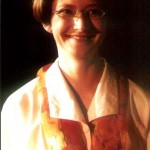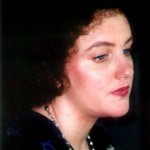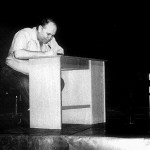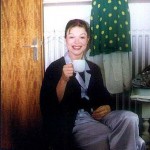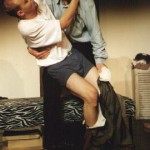
proudly presents
the 1997 production of
Sam Shepard's
Simpatico
The Players (in order of appearance)
| Vinnie ..................... | Jörg Weese |
| Carter ..................... | Johannes Lorentzen |
| Cecilia .................... | Christina Klaproth |
| Simms / "Ames" ..... | Volkhart Baumgärtner (opening night) Kenneth Wynne (other performances) |
| Kelly ....................... | Susanne Schatz |
| Rosie Carter ........... | Jensine-Bethna Wall |
The Experts
| Language coaching ....... | Kenneth Wynne, Barney Craven |
| Lighting / Stage design .. | Cornelia Daig-Kastura |
| Props / Costumes .......... | E.T.A.-Hoffmann-Theater, the cast |
| Make-Up ........................ | Elke Stein, Dagmar Kohnle, Dorothee Munz, Constanze Reißer |
| Front of house ............... | Heike Polster, Alexander Hedler, Dorothee Munz, Mark Urmann |
| Poster design / PR ......... | Cornelia Daig-Kastura |
| Photographs .................. | Heike Polster |
Lighting design and stage construction by Josef Weyrauther
Directed by Cornelia Daig-Kastura
The Author
To call Sam Shepard a modern Renaissance man is an apt description; he is a Pulitzer Prize winning playwright, an accomplished actor and a rock musician. He has won several Obie Awards for his work, among them Chicago, Icarus Mother, Red Cross, Forsenic and the Navigators, Melodrama Play, The Tooth of Crime, Action,  Curse of the Starving Class, and States of Shock. In 1979 he won the Pulitzer Prize for his play Buried Child. In 1986 Shepard was inducted into the American Academy of Arts and Letters, where he was awarded its Gold Medal for Drama in 1992. Sparse, intense works such as True West, A Lie of the Mind and Fool for Love have influenced a new generation of actors and writers. Many critics regard Sam Shepard as the most important American playwright of his generation and perhaps even the most significant American playwright since Eugene O'Neill. Simpatico, 1995, marked Shepard’s return to the stage with his first major play for nearly ten years. Curse of the Starving Class, and States of Shock. In 1979 he won the Pulitzer Prize for his play Buried Child. In 1986 Shepard was inducted into the American Academy of Arts and Letters, where he was awarded its Gold Medal for Drama in 1992. Sparse, intense works such as True West, A Lie of the Mind and Fool for Love have influenced a new generation of actors and writers. Many critics regard Sam Shepard as the most important American playwright of his generation and perhaps even the most significant American playwright since Eugene O'Neill. Simpatico, 1995, marked Shepard’s return to the stage with his first major play for nearly ten years.
Growing up on a ranch in California, Shepard first gravitated towards music and took up theatre only after his father began drinking heavily and his family situation worsened; he escaped by joining a touring theatrical group called the Bishop's Company Repertory Players. At the age of nineteen, he found himself in New York City, where he worked as a waiter at The Village Gate jazz club in Greenwich Village while performing in experimental off-Broadway venues. He ventured into writing, beginning with some well-received one-acts, and went on to write and often direct scores of plays - usually about the haunted and violent agrarian poor. Shepard also wrote the screenplays for Antonioni's Zabriskie Point, Robert Altman's Fool For Love (a screen version of his play which he also starred in) and Wim Wenders' Paris, Texas. With his dark, intense, Gary Cooperish looks, Shepard was also a natural on-screen, winning fans in the early eighties with roles in The Right Stuff and Frances. Lately, he has appeared as an actor in The Pelican Brief and Voyager (German title: Homo Faber). He has lived with Oscar-winning actress Jessica Lange since 1982. They have two children and live in Minnesota. (Cornelia Daig-Kastura)
|
On Shepard
|
"The reason I began writing plays was the hope of extending the sensation of play ... on into adult life. If ‘play’ becomes ‘labor,’ why play?" Sam Shepard (1977)
Sam Shepard (1943- ), author of more than 40 plays (the most recent being When the World Was Green. A Chef’s Fable, 1996), is currently one of the two most frequently staged American dramatists and certainly one of the most controversial. On the one hand his plays, which defy easy classification, have created utter puzzlement and subsequently fairly detractive comment, on the other Shepard was acclaimed as "the most inventive in language and revolutionary in craft ... whose work most accurately maps the interior and exterior landscapes of his society" and as "a recorder of the authentic American voice" ever since he started his career as an off-off-Broadway playwright in 1964. His development has been interpreted as a recapitulation of the major movements in 20th century drama in reverse order, progressing from expressionism to realism. Likewise, his plays have been characterized as "a movement from the middle of a situation back to its beginning."Shepard has defined the stage as "a home where [he] brings the adventures of [his] life and sorts them out, making sense or non-sense out of mysterious impressions." His plays are explorations of "an emotional territory" rather than a mundane physical reality, focussing on the actions of characters as determined by "the formulas in which experience is usually packed", by their urgent desire to play a role which is publicly acknowledged, thus producing comedy effects, profound intuitive, emotional responses, and a final shock of recognition on the part of audiences (not always during the performance but quite frequently some time after). Shepard does not guide his audiences to a final synthesis of the dualities of human personality: "I never know when to end a play. I’d just as soon not end anything. But you have to stop at some point just to let the people out of the theater. A resolution isn’t an ending; it’s a strangulation." Shepard’s treatment of character derives from the concept that "Personality is everything that is false in a human being. It is everything that’s been added on to him and contrived. It seems to me that the struggle all the time is between this sense of falseness and the other haunting sense of what is true - an essential thing that we’re born with and tend to lose track of. This naturally sets up a great contradiction in everybody between what they represent and what they know to be themselves." In Angel City, for example, he asks his actor to "consider himself a fractured whole with bits and pieces of character flying off the central theme." Shepard’s characters are marvellous storytellers because they prefer talking to acting. Language serves as "a veil hiding demons and angels which the characters are always out of touch with." Consequently, "words, at best, can only give a partial glimpse into the total world of sensate experience." Significantly enough, many of Shepard’s climactic scenes are wordless. Yet, language communicates the urgent desire of the characters to penetrate to their authentic selves, to prevent their fading into anonymity and insignificance. Though receiving hints at the unknown quantity of their true character through their pre-occupation with exteriors - paradoxically also obstructing this quest for identity and roots -, and their role-playing, they forever remain "hungry" and unstable people in the middle of their contradictions. This setup produces some of the elusive endings of Shepard’s plays providing emotional intensification rather than rational solutions. (Heiner Bus)
|
The Play
The play premiered in April 1995 in London's Royal Court Theatre, receiving critical acclaim in the press and enjoying great success with the audience.
In "a cross between a modern film noir, Ibsenesque thriller and revenge drama" (The London Evening Standard), the play's characters meet in the sad little California town of Cucamonga. Shepard tells the story of two old friends who share a shady past in the world of horse breeding; a past which threatens to lash back at them at any moment.
Vinnie has been hiding out, keeping a low profile in Cucamonga, California, after being involved in a very shady deal with his old friend, Carter. About to be caught in a race-track scam, the two first set up and then blackmailed the local racing commissioner, Simms, into silence. To add insult to injury, Carter then ran off with Vinnie's wife, Rosie, taking his Buick into the bargain. Simms has now become a bloodstock agent in Kentucky, satisfied to let the past rest. Carter has become successful with horse breeding and sends monthly checks to buy Vinnie's silence.
Vinnie, however, has grown tired of his lonely life and wants the past behind him, so he decides to come clean about all the past deceptions and lies. He summons Carter to visit him under the guise of needing help with a woman who has had him arrested. At the end of the play the roles have reversed - Vinnie is free of the burden he has carried and Carter is heading for a disastrous fall.
Our particular thanks goes to:
| Gustav Matschl, Kulturreferent und Bürgermeister der Stadt Bamberg, and Rainer Lewandowski, head of the E.T.A.-Hoffmann-Theater for their permission to use the studio The very friendly staff of the E.T.A.-Hoffmann-Theater for being ever so helpful in many ways. In particular:
Anette Krauße, for help with costumes and Gabi Lepthien for the organization of props and Professor Jochum, Lehrstuhl Englische Literaturwissenschaft, for encouragement and support in many ways Ingeborg Peñalba, for invaluable help and infinite patience with the ticket reservations Barney Craven, for help with the American accent Gerhard Fleck, Director of the Stadtsparkasse Bamberg and Werner Gallenz, Werbeleiter SSK, for generous support Druckerei Gerald Schembs, Nürnberg, for help with the posters and last but not least a very personal thank-you to Ken Wynne - it wouldn't have been possible without you! |








